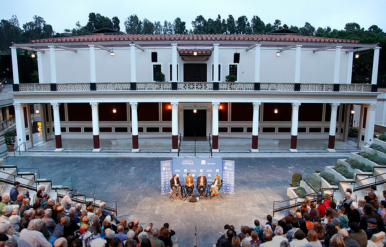“What Can the Ancient World Teach Us About Globalization?”
- News
- Interview
Syrian migrants were being rebuffed by their richer neighbors. Walls were being raised to keep out barbarian hordes. Old empires, having closed themselves off to trade, were in decline. Revolutionary religions and philosophies were being exported overseas, stirring up violent conflicts but also forging connections among far-flung peoples.
These were all challenges of the ancient world—times and places far removed from the 21st-century United States. At the outdoor amphitheater of the Getty Villa, three scholars found some surprising parallels between that distant era and our own, as they pondered the question, “What Can the Ancient World Teach Us About Globalization?”
UCSB’s Jan Nederveen Pieterse was joined by Roger Bagnall, a classics scholar at New York University, and Grant Parker, a classical philologist at Stanford University.
The hour-long event touched on several issues that were as complex and thorny in the globalized ancient world as they are today: identity and assimilation; the role of language in shaping consciousness and asserting power; and the tug-of-war between emerging global powers, eager to put their mark on the map, and decadent older powers seeking to find (often darker-skinned) scapegoats for their troubles.





